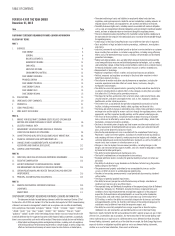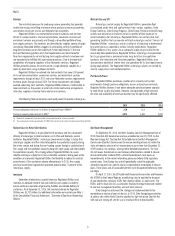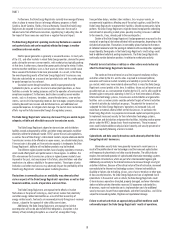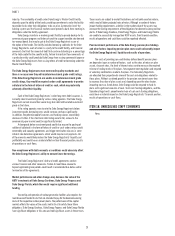Duke Energy 2015 Annual Report Download - page 30
Download and view the complete annual report
Please find page 30 of the 2015 Duke Energy annual report below. You can navigate through the pages in the report by either clicking on the pages listed below, or by using the keyword search tool below to find specific information within the annual report.
PART I
10
For additional information on the ash basins, see Notes 5 and 9 to the
Consolidated Financial Statements, “Commitments and Contingencies” and
“Asset Retirement Obligations,” respectively.
Nuclear Matters
Regulated Utilities owns, wholly or partially, 11 nuclear reactors located
at six stations. Nuclear insurance includes: nuclear liability coverage; property,
decontamination and premature decommissioning coverage; and replacement
power expense coverage. Joint owners reimburse Regulated Utilities for certain
expenses associated with nuclear insurance in accordance with joint owner
agreements. The Price-Anderson Act requires plant owners to provide for public
nuclear liability claims resulting from nuclear incidents to the maximum total
financial protection liability, which currently is $13.5 billion. For additional
information on nuclear insurance see Note 5 to the Consolidated Financial
Statements, “Commitments and Contingencies.”
Regulated Utilities has a significant future financial commitment to
dispose of spent nuclear fuel and decommission and decontaminate each plant
safely. The NCUC, PSCSC and FPSC require Regulated Utilities to update their
cost estimates for decommissioning their nuclear plants every five years.
The following table summarizes the fair value of nuclear decommissioning trust fund (NDTF) balances and cost study results for Duke Energy Carolinas, Duke
Energy Progress and Duke Energy Florida.
NDTF(a)
(in millions) December 31, 2015 December 31, 2014
Decommissioning
Costs(a)(b)
Year of
Cost Study
Duke Energy $ 5,825 $ 5,546 $ 8,130 2013 and 2014
Duke Energy Carolinas 3,050 3,042 3,420 2013
Duke Energy Progress 2,035 1,701 3,550 2014
Duke Energy Florida(c) 740 803 1,160 2013
(a) Amounts for Progress Energy equal the sum of Duke Energy Progress and Duke Energy Florida.
(b) Amounts include the Subsidiary Registrants’ ownership interest in jointly owned reactors. Other joint owners are responsible for decommissioning costs related to their interest in the reactors.
(c) Duke Energy Florida received reimbursements from the NDTF for costs related to ongoing decommissioning activity of the Crystal River Unit 3 Nuclear Plant during 2015.
The NCUC, PSCSC. FPSC and FERC have allowed Regulated Utilities’ to
recover estimated decommissioning costs through retail and wholesale rates
over the expected remaining service periods of their nuclear stations. Regulated
Utilities believes the decommissioning costs being recovered through rates,
when coupled with the existing fund balance and expected fund earnings, will
be sufficient to provide for the cost of future decommissioning. For additional
information see Note 9 to the Consolidated Financial Statements, “Asset
Retirement Obligations.”
The Nuclear Waste Policy Act of 1982 (as amended) (NWPA) provides
the framework for development by the federal government of interim storage
and permanent disposal facilities for high-level radioactive waste materials.
The NWPA promotes increased usage of interim storage of spent nuclear fuel at
existing nuclear plants. Regulated Utilities will continue to maximize the use of
spent fuel storage capability within its own facilities for as long as feasible.
Under federal law, the U.S. Department of Energy (DOE) is responsible
for the selection and construction of a facility for the permanent disposal of
spent nuclear fuel and high-level radioactive waste. Delays have occurred in the
DOE’s proposed permanent repository to be located at Yucca Mountain, Nevada.
At this time, DOE’s focus is on developing consolidated storage for commercial
spent nuclear fuel at one or more central sites rather than at a permanent
repository.
Until the DOE begins to accept the spent nuclear fuel, Duke Energy
Carolinas, Duke Energy Progress and Duke Energy Florida will continue to safely
manage their spent nuclear fuel. Under current regulatory guidelines, Harris
Nuclear Plant has sufficient storage capacity in its spent fuel pools through the
expiration of its renewed operating license. Crystal River Unit 3 was retired in
2013, and placed in SAFSTOR prior to final decommissioning. The spent fuel is
currently stored in the spent fuel pool and an independent spent fuel storage
installation will be installed to accommodate storage of all the spent nuclear
fuel until the DOE accepts the spent nuclear fuel. With certain modifications
and approvals by the U.S. Nuclear Regulatory Commission (NRC) to expand the
on-site dry cask storage facilities, spent nuclear fuel dry storage facilities will
be sufficient to provide storage space of spent fuel through the expiration of the
operating licenses, including any license renewals, for the Brunswick Nuclear
Plant, Catawba Nuclear Station, McGuire Nuclear Station, Oconee Nuclear
Station and Robinson Nuclear Plant.
The nuclear power industry faces uncertainties with respect to the cost
and long-term availability of disposal sites for spent nuclear fuel and other
radioactive waste, compliance with changing regulatory requirements, capital
outlays for modifications and new plant construction, the technological and
financial aspects of decommissioning plants at the end of their licensed lives,
and requirements relating to nuclear insurance.
Regulated Utilities is subject to the jurisdiction of the NRC for the design,
construction and operation of its nuclear generating facilities. The following
table includes the current year of expiration of nuclear operating licenses for
nuclear stations in operation. Nuclear operating licenses are potentially subject
to extension.
Unit Year of Expiration
Duke Energy Carolinas
Catawba Unit 1 & 2 2043
McGuire Unit 1 2041
McGuire Unit 2 2043
Oconee Unit 1 & 2 2033
Oconee Unit 3 2034
Duke Energy Progress
Brunswick Unit 1 2036
Brunswick Unit 2 2034
Harris 2046
Robinson 2030
Duke Energy Florida has requested the NRC to terminate the Crystal River
Unit 3 operating license as Crystal River Unit 3 permanently ceased operation
in February 2013. For additional information on decommissioning activity and
transition to SAFSTOR, see Note 4 “Regulatory Matters.”
The NRC issues orders with regard to security at nuclear plants in
response to new or emerging threats. The most recent orders include additional
restrictions on nuclear plant access, increased security measures at nuclear
facilities and closer coordination with intelligence, military, law enforcement
and emergency response functions at the federal, state and local levels. As the
NRC, other governmental entities and the industry continue to consider security
issues, it is possible that more extensive security plans could be required.
























